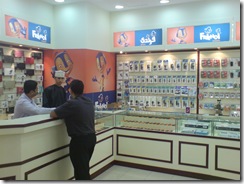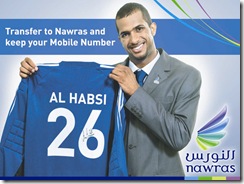Three years ago Mikkel Vinter and his team at Friendi Mobile began their journey to introduce mobile virtual telecoms operations into the Middle East and North Africa. Faced with scepticism, indifference and in some cases even hostility, the company has gone on to commercialise one venture and is at advanced stages in negotiating others. It has also penned a number of industry-modifying partnership agreements and in so doing is forcing the industry to reconsider the value that MVNOs can bring to a competitive market
Mikkel Vinter says that the three years in which his company has been in existence has helped modify attitudes towards MVNOs in the region
Having been virtual pioneers we have developed into a virtual reality,” says Mikkel Vinter, CEOof Friendi Group, referring to a description the company received from the media in 2007 as it first went about detailing its plans for the MENA region. “The first part of our three-year vision has been fulfilled. We were the first MVNO(mobile virtual network operator) to launch in the region and we have enjoyed good initial success with that. The state of the union is strong.”
The initial success that Vinter is referring to is Friendi Mobile’s operation in Oman, which opened the door to the public at the end of April this year, and within two months, had added 50,000 subscribers. The significance of this progress can be brought into better focus when comparing the entrance of Friendi Mobile with the last time a new player launched in the Omani market. Nawras, Oman’s second licensed telecoms provider entered the market as a mobile player in March 2005, when mobile penetration stood at around 35 per cent. Despite the easier competitive landscape at the time, it took Nawras two months to reach the 50,000 subscriber milestone; the same time it took Friendi Mobile in an environment of 120 per cent penetration and three other competitors.
“Oman is an important market to Friendi,” Vinter states. “Not only from the basic revenue generating perspective, but also because it is helping in removing the doubts about this business model in the region.” Nawras has been a formidable second player in Oman and had been on course to supersede Oman Mobile as the market leader in terms of subscriber numbers, having reported that customer numbers in H109 to end-June increased by 30 per cent year-on-year to 1.7 million. Oman Mobile reported that at the end of June, its subscriber based had reached 1.797 million, a year-on-year growth rate of just 11.8 per cent.
Friendi Mobile’s reseller agreement is with Omantel, the parent company of Oman Mobile, with the mobile operator evidently requiring all the assistance it can receive in staving off the advances of second-placed Nawras.
Speaking earlier this year, Omantel’s CEO Amer Al Rawas stated that this first five-year licensing agreement with Oman’s two mobile resellers would be a learning process for all parties involved, and that he would reserve judgement on their effectiveness until later in the relationship. Omantel has a similar reseller agreement with Majan Telecom, which operates under the brand name Renna, and launched commercially in Oman a fortnight after Friendi Mobile did. Renna claims a subscriber trajectory similar to that of Friendi.
“Our launch was fantastic,” says Majan Telecom CEO Niklas Nielsen. We added more than 50,000 customers in the first couple of months and our run rate has now stabilised at a sufficient level boding well for the future.” Consensus amongst industry commentators is that a subscriber base of approximately100,000 is typically sufficient in order for MVNOs to reach breakeven in a market in the Middle East, so both Omani resellers appear well on their way to achieving this within record time.
“People keep reloading their Renna SIM cards at a satisfying rate so we are happy with the way we have managed to penetrate this very competitive multi-SIM market that Oman is, with its penetration rate of around 120 per cent,” Niklas says.
Both Omani resellers have focussed on the transparency of tariffs and the offer of value in the price plans they have introduced, which are not too dissimilar to each other’s, or to the two mobile network operators. However, where Friendi Mobile in particular looks to gain the most traction is in the targeting of expatriate communities resident in Oman, who are looking to remain in regular touch with friends and family abroad.
In July Friendi Group announced the launch of a programme called Reach Out, which was the first building block in the player’s strategy to provide Friendi Mobile customers in Oman and those out of the country with competitive mobile international call rates.
The first phase of the Reach Out programme was the launch of a partnership between Friendi Group and Idea Cellular of India. Friendi Mobile customers in Oman are able to call Idea subscribers in Kerala at a rate as low as 139 Bz (US$0.36) per minute, the lowest international mobile call rate from any mobile provider in Oman to India. Idea subscribers in Kerala will also benefit from a reduced rate when calling Friendi Mobile customers in Oman, with all calls charged at INR9.19 (US$0.19) per minute.
The two mobile resellers in Oman claim more than 100,000 subscribers between them, representing a market share of around three per cent
The deal with Idea Cellular was a precursor to an agreement announced a month later when Friendi Group revealed it had entered into a collaborative arrangement with Axiata Group (formerly known as TM International), with the intention of the two companies being to work together to address the communications needs of expatriates working in the markets Axiata and Friendi operate in.
Amongst the areas of cooperation to be explored is the possibility of setting up co-branding and MVNO relationships between the two groups. The terms of the agreement will also extend to the provision of content and services.
The deal will also have the added benefit of allowing Axiata access to the lucrative Middle East market. Axiata operating companies will be able to reach out and capture the market and do business with their own nationals living overseas.
Axiata is one of the largest Asian telecommunication companies, focussed in high growth low penetration emerging markets. The operator has controlling interests in mobile networks in Malaysia, Indonesia, Sri Lanka, Bangladesh and Cambodia with significant strategic stakes in India, Singapore and Iran.
“Axiata’s footprint is a relevant one to expats in the Gulf and the collaboration agreement lays down a framework upon which we can closer align ourselves with operations in Asia,” Vinter explains.
Friendi Group is not only expanding its activities geographically, but is also developing a number of sub-brands that will fall under the group umbrella, but which are likely to remain differentiated from one another. In Oman for example, the MVNO introduced a second of its brands to the market, called Halafoni and targeted at the youth market in the country. Halafoni is the result of a tie-up with UAE-based broadcaster MBC and is aimed at young Arab speakers and nationals, with a focus on downloadable content, some of which will be from Hala FM, MBCGroup’s local radio station in Oman.
“We are looking to build a trendy offer for young Omanis,” comments Vinter. “The point is to offer differentiated, segmented services, so for instance, Halafoni subscribers will be able to download music at a special rate or call into the local radio station at a discounted rate, which makes them part of something, part of a community of their own,” he adds.
Vinter would like to see this multi-brand approach replicated in other markets and believes the scope does exist for the successful introduction of such brands should the identification process of such niches be well-executed. “Friendi Group’s operations are scalable in two directions – regional as well as multi-branding. And with a sub-brand, the break even point is even lower, somewhere in the region of around 50,000 users,” says Vinter.
Majan Telecom’s Nielsen has been observing Friendi Group’s developments with interest, but remains confident that the pie remains large enough for multiple operators to profitably enjoy a piece of the action. “The world is big and there are many players: operators, investors, distributors and brand owners alike. We are willing to discuss with all who like what they have heard and seen from our side. Who knows, such discussions might result in a win-win relationship and the next successful launch somewhere in the region or surrounding geographies,” Nielsen comments.
With respect to the international partnerships Friendi Group is forging, Nielsen says he regards such moves as relevant if one wants to launch operations based on the MVNO model, and it seems from the outside as being a step in the right direction. “I wish them the best of luck,” he says simply.
Nawras has been gaining market share consistently throughout its lifespan, having benefited from mobile number portability as well as a focus on the youth market
Vinter describes Saudi Arabia, the UAE, South Asia and Africa as countries and geographic regions of interest to Friendi Group, which is confident of closing one more MVNO agreement this year, with a further number in the pipeline.
“The year 2010 is promising as we have a good number of strong, live, late stage negotiations taking place across the region,” Vinter comments. “We are engaged in conversations across 20 countries, and one of the things I am most encouraged by is the changing attitude of the market. In the beginning we were the ones knocking on all the doors, now we have parties coming and knocking on ours and looking to do things together,” he adds.
The time and effort spent in introducing the MVNO model to the Middle East region has been well spent, Vinter believes, and is starting to pay off as the company is being recognised from various players in the value chain as a party that can potentially bring additional value to operations. Though Friendi Group and Majan Telecom are the first commercial MVNOs in the Middle East, other parties have expressed interest in the business model.
In Jordan, for example, Friendi Group holds a MVNO licence alongside i2, the Saudi-based mobile distributor and wholesaler. Jordan’s fiercely competitive mobile landscape has disinclined any of the four mobile network operators to pen any such agreements, though Vinter says now that the 3Gspectrum award process is out of the way, his company is set to re-engage in conversations with prospective operator partners.
UAE retailer Axiom Telecom has also gone on record expressing its desire to expand operations to incorporate virtual services, having considered markets such as India as potentially of interest. It thus appears likely that the coming six-18 months shall produce significant activity in the MVNO space across the Middle East, Africa and South Asia regions.





0 comments ↓
There are no comments yet...Kick things off by filling out the form below.
Leave a Comment